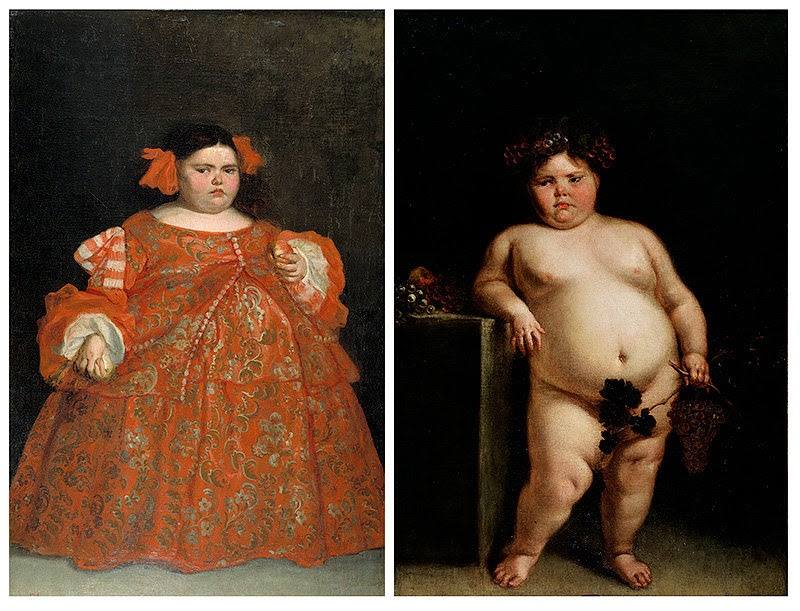|
La Monstrua Desnuda Oiled glow of swagbelly, the dimpled pillars of her legs, calf flesh cuffing ankles, young puffed pouches of breasts-- for three hundred and forty-six years, Eugenia’s body has been admired as a prodigy of nature, in arcades of buffoons, dwarves and men of pleasure. An empire’s loaner, she crossed seas to hang temporarily in this island space. Curvature of the inflated globe of her middle-- brushed with crushed pearls, so that, back-shadowed in black, she’s lit from within. It was mercy on himself, the painter, or for the child posed nude against the table, to put in her hand a stem of black grapes from Asturias, to wrap her vulva in three leaves, and crown her with grapevines. Una niña gigante-- abnormality styled as a baroque Baco. In a room of retratos by Velázquez, I stand by Eugenia for a long time. I morph into a sculpture of Eugenia, for never in this Earth’s constant flash of images have I seen so purely and perfectly a likeness of myself— Eugenia Martínez Vallejo, born in Bárcenas, given up by her parents at El Alcázar in Madrid to marvel the royal court and dwell in its protection. She was six years old, abandoned plaything of el Rey Carlos II, himself un inválido, barely able to rule, but under whom herds of humans were carried to quemaderos, burning places of the auto-de-fé. The court ordered Juan Carreño de Miranda to paint two portraits of la monstrua, una desnuda y una vestida de gala. Eugenia stood undressed for the painter, but she didn’t yield, enfant terrible with hyperphagia. She averted red face in a cut-eye of pout and rage. Carreño de Miranda painted white dashes on her lower eyelids that will never spill over into tears. I live in the sneer of her face. Gawked at girl, phenomenal weight advertised in the press, a child displayed for royal visitors, naked Eugenia. Orphaned, how long did you live at court? How long did you live? La monstrua vestida painted in a red brocade dome of a dress, red rotunda, red bloated brass bell-- Expanding red giant-- You could pick her up by the head and ring out the hour. In each grabby, hoggish hand, she holds a red apple, quenchless hunger of the Spanish Empire embodied in one girl. One apple for Spain and one for Puerto Rico. Eugenia was the ripest apple on the tree. Carlos II had no children. Were there children at the court to pinch her and pull her around by her red hair ribbons? Weakened by Prader-Willi, if she fell asleep under a window, did someone lug her to bed? Eugenia and the dwarves will return to el Museo de Prado, but I will keep a postcard of Eugenia in my bag. I notice other women like me, and now I note people with achondroplasia, wherever I go, one hoisting a computer overhead in a hallway of the medical school, two dwarves driving mini street-sweepers, one with corn-rowed hair in a meridian on prison detail, one riding a bike, carrying across the handlebars a lead pipe for those who gape, Calle 13’s bailarina Karlita holding a tall ice cream cone. We are the big and small people of the world, Obatalá’s children, still anomalies, the freaky-freaky of sideshows. We don’t fit what is built and bargained for in this world. Eugenia is my fierce beauty and force, so I’ll claim la estética de lo feo-- my own baroque body misshapen, obese, sometimes an iron maiden of pain, something I drag, heave, roll and sway. Oiled gleam of swagbelly, the dimpled pillars of my legs, calf flesh cuffing ankles, puffed pouches of breasts-- the everyday looks, the uninvited words often said. Soy una esteticista comprometida de lo feo. Eugenia’s postcard rides in my purse, like a pocket manifesto, a red grenade. Loretta Collins Klobah Loretta Collins Klobah is a professor of Caribbean Literature and creative writing at the University of Puerto Rico. Her poetry collection The Twelve-Foot Neon Woman (Leeds: Peepal Tree Press, 2011) received the 2012 OCM Bocas Prize in Caribbean Literature in the category of poetry and was short listed for the 2012 Felix Dennis Prize for Best First Collection in the Forward poetry prize series. Her poems have appeared in The New Yorker, Best American Poetry 2016, BIM, Caribbean Beat Magazine, The Caribbean Writer, The Caribbean Review of Books, Poui: The Cave Hill Literary Annual, Susumba’s Book Bag, Moko: Caribbean Arts and Letters, WomanSpeak, TriQuarterly Review, Quarterly West, Black Warrior Review, The Missouri Review, The Antioch Review, Cimarron Review and Poet Lore.
2 Comments
3/2/2017 10:22:22 am
Loretta Collins Klobah is carving a unique place for herself in contemporary world literature. Her poems, as evidenced in her award winning The Twelve-Foot Neon Woman (2011) chronicle personal history (entering the borders of confessional revelation,) contemporary Caribbean and past world history (as in this poem.) Living in Puerto Rico, she unapologetically, (and without translation) makes her poems a bi-lingual adventure. Adenturous in imagination, bold in perspective, she does not look over her shoulder for critical approval, but forges ahead with a stylistic freshness. She is at the cutting edge of contemporary poetry. Good stuff!
Reply
Your comment will be posted after it is approved.
Leave a Reply. |
The Ekphrastic Review
COOKIES/PRIVACY
This site uses cookies to deliver your best navigation experience this time and next. Continuing here means you consent to cookies. Thank you. Join us on Facebook:
July 2024
|




